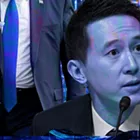About a year and a half ago, more-than-slightly-eccentric director Tim Burton announced that his next film would be Charlie and the Chocolate Factory. And he made it very clear that it wouldn't have much resemblance to the 1971 film, Willie Wonka & the Chocolate Factory, a film that he pretty much despised. Burton promised that he was going to stick much closer to the Roald Dahl book.
He kept his promise. And in doing so, he made a better film, with better character development, smoother direction, much more dazzling design, and more of an all-around childlike sense of wonder. Surprisingly, he also made it less edgy. Or maybe it's Johnny Depp, in the Willie Wonka role, who made it less creepy than the original Gene Wilder performance. Whatever the reason, this new version has a lot more heart at its tasty chocolate center
Starting with myriad examples of the set design to come, Burton takes us on an assembly-line tour of the factory of the title, following Wonka's prize chocolate from vats to delivery trucks. Then he introduces the crooked, ramshackle home of Charlie Buckets (Freddie Highmore) and his close, loving, but very poor family -- Mom, Dad, and two sets of grandparents subsisting on all sorts of cabbage recipes.
And we get a flashback history of Willie Wonka, a shy and shady character who literally stays in the shadows. He began with a single candy store, was denied the pleasures of eating candy on Halloween by his strict dentist father (Christopher Lee), eventually opened up the biggest candy factory in the land, closed it under mysterious circumstances, then reopened it -- but where are all the workers? -- under even more mysterious circumstances.
Happy little Charlie gets a birthday present of one Wonka chocolate bar each year for his birthday. And he wonders if, this year, he might open one of the five special bars that has a "Golden Ticket" in it -- which will allow five youngsters to take a tour of the special factory, and maybe win a special prize.
Of course he gets one of them. But he's the only one of five who's excited about it. The other four kids are portrayed as little monsters -- the overweight (due to chocolate) Augustus; the horribly demanding Veruca; the gum-chewing, full-of-herself Violet; the video game-addicted Mike (who hates chocolate). All five of the kids have very large eyes. But only Charlie's do any dancing, and only Charlie wears a genuine smile.
As the once-in-a-lifetime tour begins, there are strong hints that Wonka is out of his nut. A big mechanical, musical welcome is destroyed -- by him -- in a fire. And when he finally appears -- pale skin, huge goggles, perfect teeth (thanks to Dad), fancy duds, Prince Valiant haircut -- he resorts to quoting from the song "Good Morning Starshine" and reading prepared notes from index cards.
Willy Wonka, you see, doesn't like kids. They make him nervous. And there's reason to believe that he didn't have a very happy childhood, with the flashbacks to prove it. He can't even say the word "parents."
So among all the bright lights and pretty colors and oodles of candy and tiny assistants called Oompa Loompas (all digitally and quite creepily portrayed by short actor Deep Roy, who played Mr. Soggybottom in Big Fish), there's an impending sense of menace, which is brought front and center by Danny Elfman's often malevolent score. Oddly, other sections of music are as happy as can be, even when Roald Dahl's lyrics are added for big song and dance numbers.
Not to worry -- everyone survives. But it is a little weird that the kids' chaperones, most of them their parents, don't appear very worried when one of the children turns into a giant blueberry and another is attacked by frantic squirrels -- in the film's one truly scary sequence -- even though all of these kids, save Charlie, deserve it.
Depp gives another winning but quirky performance, sometimes seeming to channel Jim Carrey when the mugging begins or when he turns robotic. And he gets even weirder when he starts spouting both beatnik and hippie talk to the uncomprehending kids. But he's also excellent at showing, through facial expressions, a sad and troubled side. Highmore may seem bland in his part, but that could be because Burton has all the other kids overact so much. And David Kelly, as Charlie's Grandpa Joe, is a scene-stealer of the grandest order.
The visual effects are fantastic, notably during the wild rides in the factory. The only weak area is when the film repeatedly breaks into those song and dance bits. That's possibly because Dahl wasn't exactly known for being a lyricist. But it's probably more because they're filled with those Oompa Loompas: Every one of them, unnervingly, looks exactly alike.














